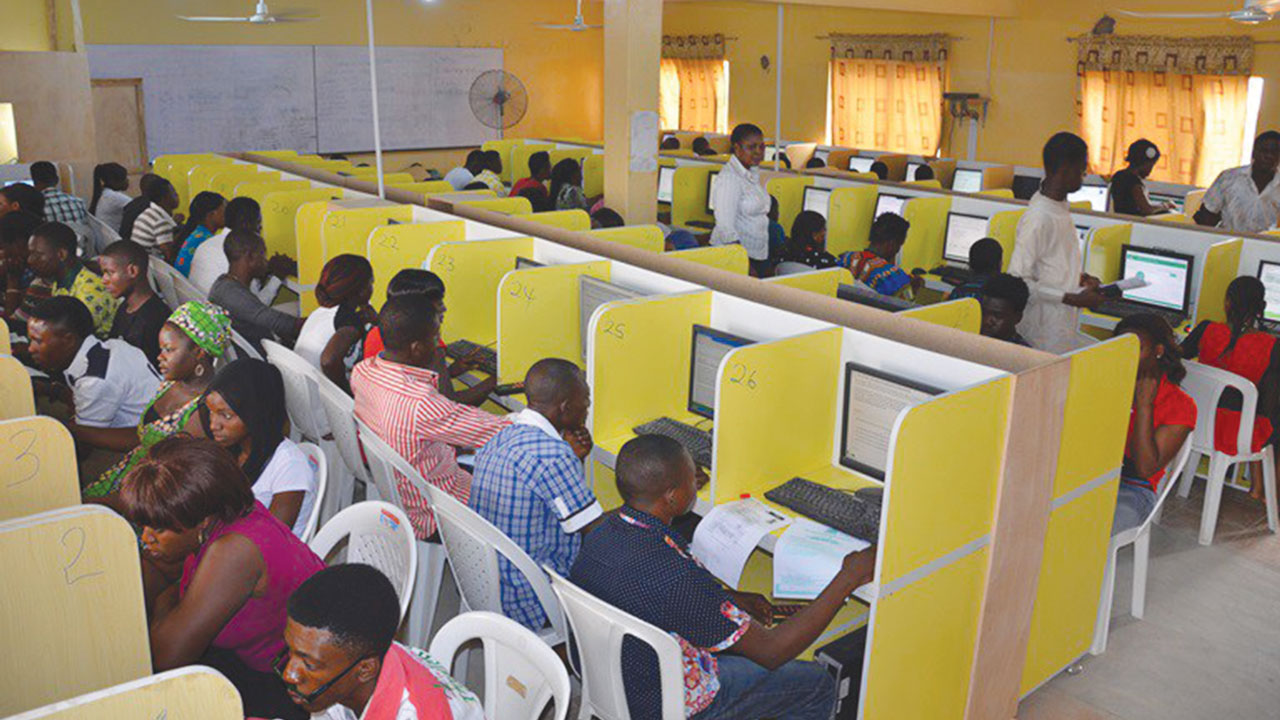The numbers are out, and they are alarming. Of the nearly 2 million candidates who sat the 2025 Unified Tertiary Matriculation Examination (UTME), more than 78 per cent scored below 200 out of the obtainable 400 marks. The results left many tongues wagging.
For many students, the UTME is more than just an exam; it is a make-or-break moment that determines their chances of gaining higher education. Going by the results released by JAMB on 9 May, where only 21.5 per cent scored 200 and above, candidates are crying, parents are anxious, teachers are frustrated, and educationists are warning of a deeper crisis that numbers alone cannot capture.
On Monday, a 19-year-old female candidate, Timilehin Opesusi reportedly committed suicide in Lagos for allegedly scoring 190 marks.
Ms Opesusi, a resident of Odogunyan, Ikorodu, in Lagos State, allegedly ingested a rodenticide, which led to her death. The deceased, who sat the UTME last year and scored higher, had this year applied to study Microbiology in a university.
A mental health psychologist, Patricia Udosen, in an interview with Punch Newspaper affirmed that the pressure to succeed can be overwhelming, and the disappointment of not meeting expectations can be crushing.
According to her, students can emerge stronger and more resilient with the right mindset and support; encouraging them to process their emotions constructively and seek support when needed.
JAMB reviews results

The loud public outcry over what many described as “mass failure” forced JAMB to have a second look at its record.
Addressing a briefing on Wednesday at the board’s headquarters in Bwari, Abuja, Nigeria’s Federal Capital Territory (FCT), JAMB Registrar, Is-haq Oloyede, said there has been “a lot of hoopla since the results of 2025 UTME were released last Friday, 9 May.
“Despite the fact that JAMB is a responsive organisation, the unusual level of public concerns and loud complaints has prompted us to do an immediate audit or review of what happened, which we ordinarily would have done in June. I want to make it clear that our review and investigation reveal that there are grounds for the complaints about our 2025 UTME results and this press conference is convened with a view to unveiling the bitter truth of our findings openly and objectively,” Mr Oloyede, a professor, humbly admitted.
What went wrong?
According to Mr Oloyede, one of its two “operational vehicles to traverse Nigeria under the code names of KAD and LAG” encountered a problem.
The 36 states of the federation and the FCT were distributed under the two categories with KAD comprising the Northern states excluding Kano, Katsina, Jigawa, Niger, Kogi and FCT but it includes the six South South states. The LAG vehicle, JAMB said, consists of Southern states excluding the six South South states but includes Kano, Katsina, Jigawa, Niger, Kogi and FCT.
Oloyede further explained: “After the mock examinations this year, we reviewed our LAG (which includes South West and South East states as earlier indicated) and KAD examination engines. We realised that in the LAG category, options to the items of our examinations were not shuffled. We insisted that the shuffling must be effected. After this was done, we tested the update as usual and we were satisfied. We thereafter still did what we call dummy, a simulation, a day before the examinations and everything seemed to be okay. In other words, we believed we were ready to deploy the items after some layers of testing the processes.
“However, on the second day of the examinations this year, which was Friday, 25 April, we discovered that there was some omission in the items within the LAG category. An update for correction and grading adjustment was instantly made, and it was tested on Saturday, Sunday and Monday. The update was applied after 12 a.m. on Tuesday morning, and it was successful. That was why all the examinations from Tuesday till the end of UTME had no problem.
“To correct and re-upload the responses (i.e. results) from LAG for the pre-Tuesday glitch, the service providers concerned with LAG were deployed to effect the patch, but there were patch errors in some centres (servers) for the first three or four days in only two locations.”
JAMB said its findings revealed that while 65 centres (206,610 candidates) were affected in the Lagos zone (comprising only Lagos State), 92 centres (173,387 candidates) were affected in the Owerri zone, which includes the South East states.
“In clear terms, in the process of rectifying the issue, the technical personnel deployed by the Service Provider for LAG (Lagos and South-East zones) inadvertently failed to update some of the delivery servers. Regrettably, this oversight went undetected prior to the release of the results.”
By implication, a total of 379,997 candidates will retake the examination across 153 centres in Lagos and the South East states.
DevReporting findings show similar pass rate pattern
The results analysis released by JAMB on 5 May has continued to stir national concern and raised questions about the candidates’ preparedness, the effectiveness of the curriculum, and the quality of Nigeria’s education system.

Based on the 2025 UTME results released by JAMB which have now been found to be erroneous, of the total 1,955,069 candidates who sat the exam, only 4,756, representing 0.24 per cent scored 320 and above. Another 7,658 candidates (0.39 per cent) scored between 300 and 319.
A broader 3.76 per cent, translating to 73,441 candidates, secured scores in the 250 to 299 range, while 334,560 candidates (17.11 per cent) scored between 200 and 249. The majority of candidates clustered in the lower range, as 983,187 candidates (50.29 per cent) scored between 160 and 199, while 488,197 candidates (24.97 per cent) scored between 140 and 159. Beyond these percentages lies a troubling story about the state of education in Nigeria.
DevReporting however observed that the number of candidates sitting the UTME has continued to grow over the years, but the results show that many candidates still score below 200.

In 2021, about 1,338,687 candidates registered for the exam, but of the 1,312,260 results released, only 168,613 (12.85 per cent) scored above 200, while over 1.143,647 million (87.15 per cent) scored below 200.
By 2022, the number of candidates increased to over 1,761,338 million while 1.7 million sat the exam. More students performed better that year, as 378,639 (22.27 per cent) scored above 200, while 1.326 million (78 per cent) scored below 200.
In 2023, 1,595,779 million candidates registered while 1,518,027 sat the exam. Again, most of the candidates, 1,162,848 million (76.60 per cent) scored below 200, while 355,179 (23.39 per cent) scored above 200.
The year 2024 also recorded a jump in participation and performance. Of the 1,989,668 candidates that registered, 1,904,189 sat the exam. Of the 1,842,464 results released, 1,402,490 million candidates (76.12 per cent) scored below 200, while 439,971 (23.87 per cent) of them scored above 200.
However, in 2025, even though the number of registered candidates rose to over 2,030,627, 1,955,069 sat the exam. Of the number that sat the exam, 1,534,654 million candidates (78.49 per cent) scored below 200, while 420,415 candidates (21.50 per cent) scored above 200.
The data collated from JAMB documents and media reports indicates that as more students take the UTME each year, more candidates score below 200. The 2024 exam stands out as the best year in terms of the number of candidates (517,044) who scored above 200 in five years.
Stakeholders raise concerns

Every coin has two sides, while a few are rejoicing over their excellent performance, many others have protested their scores. Results analysis earlier released by JAMB showed that 12,414 (0.63 per cent) scored 300 and above in the exam.
Ahead of the UTME, candidates, parents/guardians, and stakeholders had raised concerns over some situations that played out during the mock exams, expressing fear of the possibility of the same issues playing out during the main exam.
The release of the results has continued to stir conversations from different quarters. Some parents threatened legal action, calling on JAMB to make the marking sheets and scoring details public, to enable candidates verify the accuracy of their results.
In preparation for a lawsuit against JAMB, the chief executive officer of Educare, a software solution for schools, Alex Onyia, began compiling a list of affected candidates. According to Mr Onyia, more than 11,000 candidates have filled the form as of Monday morning.
He posted a letter from JAMB on Tuesday inviting him to be part of the thorough review of the 2025 UTME exam. “After our review, I will publicly share my findings,” he assured.
An educator and mentor, Daudu Oluwaseun, expressed his grievance over how a student who had scored as high as 295 in UTME in 2024, aced several mock exams, and had an outstanding WASSCE result, would now score as low as 132 this year.
Oluwaseun, in a video posted on his X handle @Quwam001 said, “This is not just about the low scores but about a broken system, and we will not be silent. Students are crying, parents are confused, while educators are questioning the entire method. We demand transparency and answers,” he said.
Ayotripster also posted using the hashtag ‘#thisisnotmyresult’ on X @ayotripster1: “think it is high time they scrap (scrapped) this UTME stuff and let schools run their exams by themselves, it’s obvious JAMB is just trying to generate revenue.”
A parent and public relations consultant, Bolaji Abimbola, commended the JAMB registrar, for the positive reforms and accountability witnessed under his leadership, especially the board’s consistent remittance of funds to the federal government.
However, he emphasised that JAMB’s success should not be measured by revenue generation alone, but by how effectively it fulfills its core mandate as an examination body.
Mr Abimbola expressed concern over the recurring mass failure in UTME, noting that it is unfair to blame students without interrogating deeper systemic issues. He further criticised the logistics, especially scheduling challenges that candidates faced.
Using his daughter’s experience as an example, Mr Abimbola described the 6:30 a.m. reporting time as ‘inhuman,’ arguing that no child should be expected to perform optimally after such stressful early hours.
The PR expert called on JAMB to ensure that exam centres are assigned based on proximity and to adjust arrival at centre times to at least 9am for the sake of students’ safety and mental preparedness.
Failure spotlights deep-rooted systemic issues

According to an educationist, Yomi Otubela, what the performance statistics have revealed is more than individual shortcomings but the deep-rooted systemic issues in the nation’s education landscape.
Mr Otubela, the National President of National Association of Proprietors of Private Schools (NAPPS) Nigeria, identified foundational failure as one of the factors responsible for poor performance, where many schools are overcrowded, underfunded, and have poorly trained teachers, leaving students unprepared.
Another factor, according to him, is the false confidence some students get from WAEC malpractice, lamenting that the rise of miracle centres has led to inflated WASSCE results, giving students a false sense of ability.
Mr Otubela further blamed the poor performance on technical glitches as numerous candidates reported issues like questions not loading properly, which he said JAMB must address urgently to ensure fairness.
Additionally, he said that the digital divide must be closed through investment in ICT infrastructure and digital literacy programmes.
While he identified another factor as rote learning over reasoning where schools’ curriculum still lean heavily on memorisation, he noted that the cracks are becoming visible as JAMB now focuses more on comprehension and logic.
Offering a way forward, Mr Otubela stressed that JAMB must evolve beyond merely conducting examinations, urging the board to take on a more proactive role in preparing candidates, particularly those from disadvantaged backgrounds, for CBT.
“JAMB should provide free CBT simulations across the country, make past questions and exam formats publicly accessible, and partner with schools to deliver digital readiness sessions that help bridge the gap.”
Mr Otubela further encouraged all stakeholders including: government, school owners, parents, and policymakers to return to the roots of education reform.
Creating learning content that competes with online distractions
According to the Ogun State Education Ambassador, Kayode Adewale, the influence of distracting online content is one of the most overlooked factors responsible for the worrisome decline in academic performance.
“Our students are digital natives with near-constant access to smartphones and the internet, yet most of what they consume online are not designed to educate. Out of every 10 videos they watch, eight are distractions, ranging from pure entertainment to misleading content that robs them of focus and intellectual development.”
He stressed the need for systemic support to enable teachers to actively create and curate engaging, high-quality educational content that can compete with the appeal of popular online distractions. “We must take ownership of this space and fill it with resources that prepare students to thrive in modern society,” he submitted.
Mr Adewale further noted that parents must become active partners with teachers in navigating this era of digital transformation while the government must actively monitor and regulate the digital content being consumed by young people. Regulatory bodies, he said, must also be empowered to screen content and hold producers of harmful material accountable.
Timing of exam faulty
Also commenting on the UTME performance, the publisher and founder of Diamond Media, Collins Ojiehanor, criticised what he described as the unrealistic scheduling of exams as early as 6:30 a.m, saying, it is not only inconsiderate but detrimental to candidates’ performance.
He argued that many students, particularly those who travel long distances or reside in less secured regions, are placed under immense stress by such early examination times. “You can’t expect optimal performance from young people who are barely rested, anxious for their safety, and racing against time.”
Mr Ojiehanor further cited a deepening erosion of educational values among Nigerian youth, blaming a growing subculture that promotes the ‘school na scam’ ideology, which, according to him, is steadily undermining the importance of formal education.
He also lamented the growing idolisation of entertainers at the expense of intellectuals and professionals. “Education is now viewed as a burden, not a stepping stone. The aspiration for academic success has greatly diminished,” he lamented.
Beyond the shift in mindset, the publisher highlighted the harsh academic reality, saying, many candidates are simply unprepared for the rigour of standardised exams. “We must re-evaluate our priorities as a society, and overhaul the educational curriculum.”
Failure, reflection of inability to cheat – Minister

Despite the numerous issues raised by stakeholders about candidates’ performance this year, the Minister of Education, Olatunji Alausa had described their performance as a reflection of exams being done the proper way.
According to him, the poor performance recorded was as a result of the inability of candidates to cheat in the exam.
He said: “We have to use technology to fight this fraud. We have a lot of miracle centres and this is not acceptable. People cheat through the secondary school exams WAEC and NECO and then they go to do JAMB where they cannot cheat and that is the reflection of what we are seeing today.
“JAMB conducts its exam using computer-based-testing (CBT). It has put so much security in place that fraud or cheating has been completely eliminated. The pervasive cheating in WAEC, NECO is what is causing the mess we are in. When you allow the questions to leak, it demotivates the students who desire to do well”.
He emphasised the need to institute CBT for other exams conducted by WAEC and NECO, as well as NABTEB, among others, even as he decreed that WAEC and NECO will migrate their exams to CBT by November this year. “By 2027, all exams will be fully CBT,” he reiterated.
Challenging the minister’s statement which suggested that students failed JAMB due to inability to engage in malpractice as they do while sitting WASSCE, Mr Abimbola, the PR expert, stressed the need for policymakers to rely on empirical data before making categorical statements.
He noted that WASSCE is still written in the paper form, which is the traditional form while JAMB is CBT. “We need to look back and ask ourselves, are we ensuring inclusion in this JAMB exam? We need to check these things before we go out to make categorical statements. The conditions for the exams are different, so I totally disagree with the minister unless he can show data.
“Have you discovered that some of these children who did not do so well in JAMB, go to do post UTME entrance exams in the universities and score better than those who scored high in JAMB. This is because the conditions are different.”
Mr Abimbola called for a round-table discussion involving all stakeholders to review the structure, conditions, and timing of the UTME while he proposed policy reforms such as allowing only students who have passed WAEC to sit for JAMB, creating mega CBT centres in all states, and aligning school curricula with JAMB standards.
“We can’t keep blaming the children for a system we ourselves have failed to align,” he stated.
JAMB admits error
While speaking on Wednesday, the JAMB registrar took responsibility for the error discovered during the review of the results, saying as an organisation run by human beings, errors could not be completely avoided.
“I understand that there are three powerful expressions which contain one word, two words and three words respectively. They are please, thank you and I am sorry. So, I appeal to the candidates and those affected by the error of our system to accept this explanation as the truth of the matter without embellishment, PLEASE. I apologise and take full responsibility not just in words,” the registrar said.



